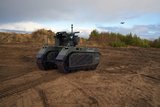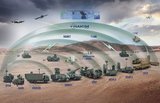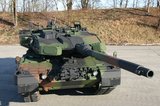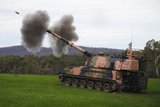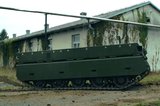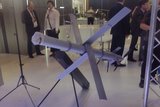UK DragonFire laser weapon completes successful test
The DragonFire laser-directed energy weapon destroyed an aerial target at the UK's Hebrides range. (Photo: Leonardo)
The UK’s DragonFire laser-directed energy weapon (LDEW) system has passed a significant milestone by successfully firing against aerial targets at the UK MoD’s Hebrides Range off the north-west coast of Scotland.
The range of DragonFire has been classified, but the line-of-sight weapon can engage with any visible target and the test-firing was a first for the UK.
The latest trial was sponsored by the MoD’s Defence Science and Technology (DST) organisation and Strategic Programmes. The laser was enabled by many other agencies across government, ensuring all regulatory and safety approval requirements were satisfied.
Organisations and companies involved include Leonardo, MBDA and the UK MoD’s Defence, Science and Technology Laboratory (Dstl).
Dstl said: “This milestone demonstrated the ability to engage aerial targets at relevant ranges and is a major step in bringing this technology into service. The technology is being considered by both the Army and Royal Navy as part of their future air defence capabilities.
“Building on this research, the MOD recently announced its intention to fund a multi-million-pound programme to transition the technology from the research environment to the battlefield.
“The latest milestone builds on a series of highly successful trials, including the first static high-power laser firing of a sovereign UK capability and demonstration of the DragonFire system's ability to track moving air and sea targets with very high accuracy at range.”
The development came from a 2017 £30 million (US$38-million) contract from the MoD’s Chief Scientific Advisor’s Research Programme awarded to the DragonFire consortium to demonstrate the potential of LDEWs and part of a £100 million effort with funding from other sources including industry.
More from Land Warfare
-
![Active vehicle protection comes to the forefront as Trophy and Iron Fist secure contracts]()
Active vehicle protection comes to the forefront as Trophy and Iron Fist secure contracts
Experience on the battlefield is accelerating the adoption of active protection systems as technologies continue to evolve to reflect shifting global defence needs.
-
![World Defense Show 2026: Hanwha increases Middle East presence and reveals Tigon 6x6 sale]()
World Defense Show 2026: Hanwha increases Middle East presence and reveals Tigon 6x6 sale
Shephard sat down with Hanwha Middle East and Africa president Sung Il at World Defense Show 2026 to hear about the company’s plans for the region and how it plans to use local industry success to win deals.
-
![World Defense Show 2026: DOK-ING working on MV-8 variants and reveals specs ahead of Eurosatory]()
World Defense Show 2026: DOK-ING working on MV-8 variants and reveals specs ahead of Eurosatory
The Croatian company began the development of the MV-8 modular uncrewed platform in the early 2020s. Specifications for the vehicle were revealed to Shephard at World Defense Show 2026.
-
![World Defense Show 2026: Russia reveals details of new loitering munition]()
World Defense Show 2026: Russia reveals details of new loitering munition
The Kalashnikov RUS-PE cannister-launched man-portable loitering munition was displayed as a model at World Defense Show 2026 with a company official telling Shephard it was “in service and in low-rate initial production”.









